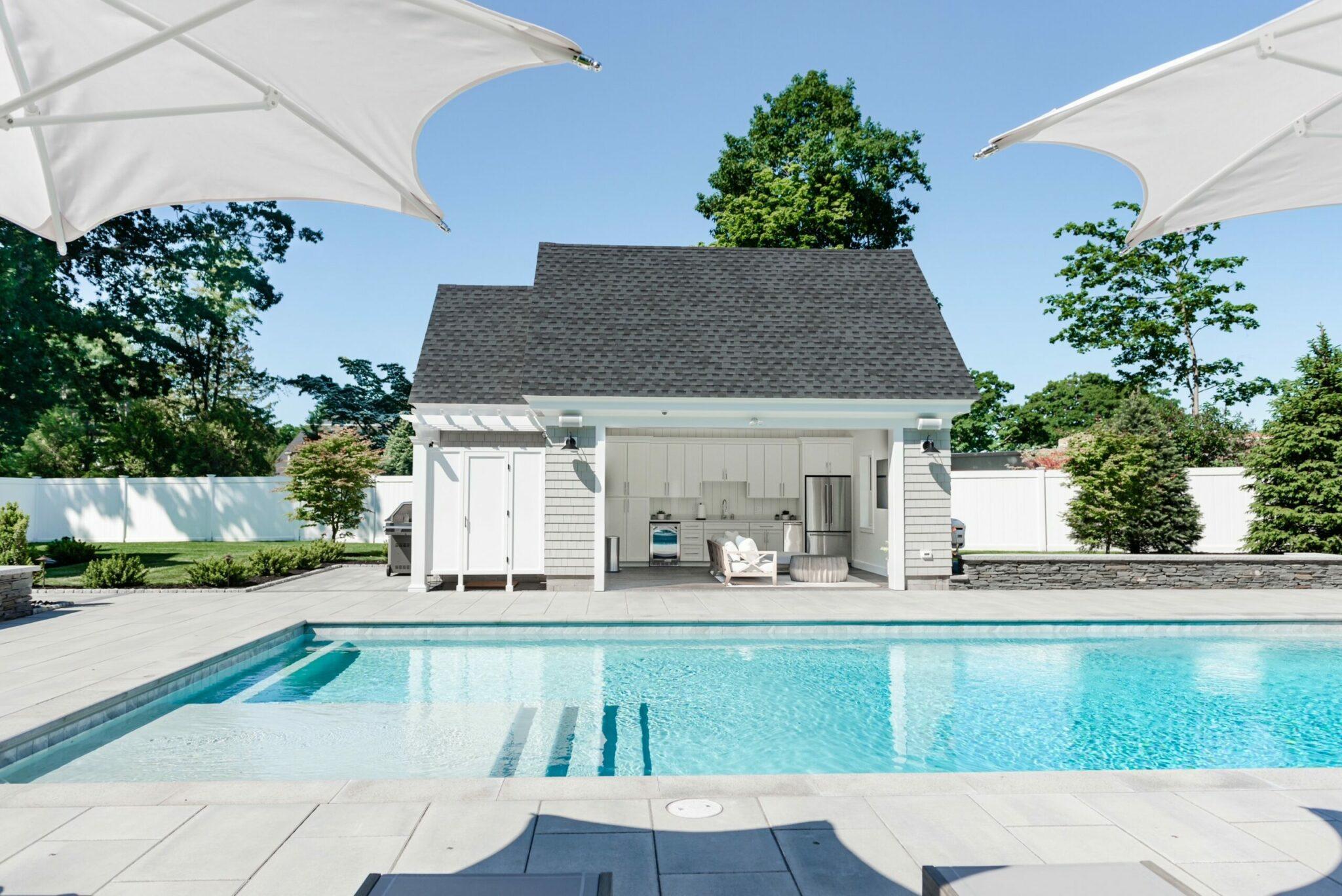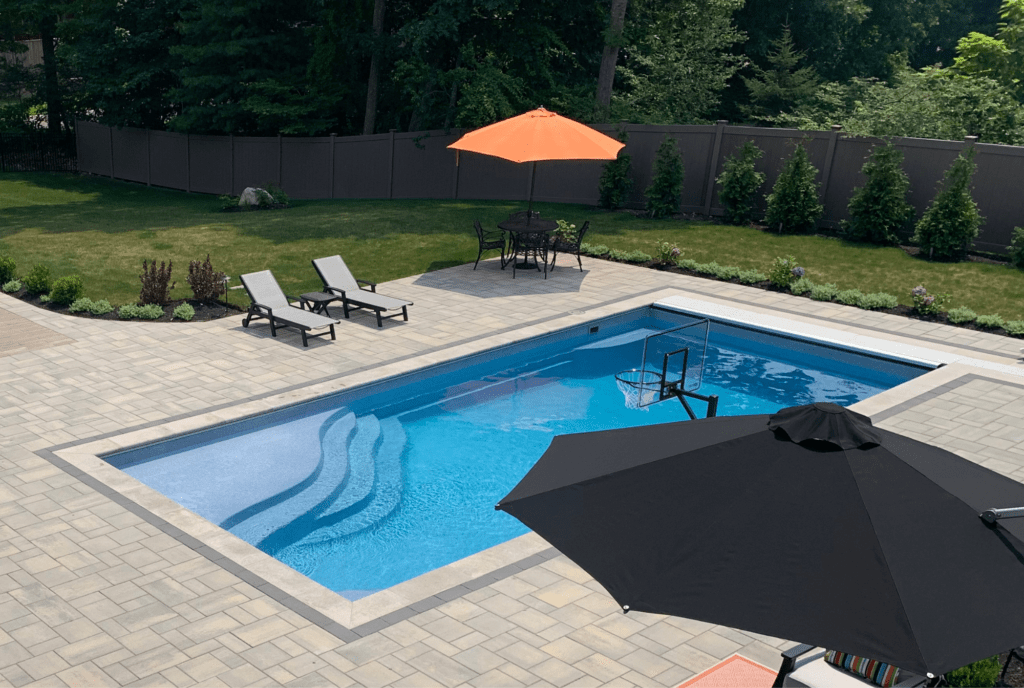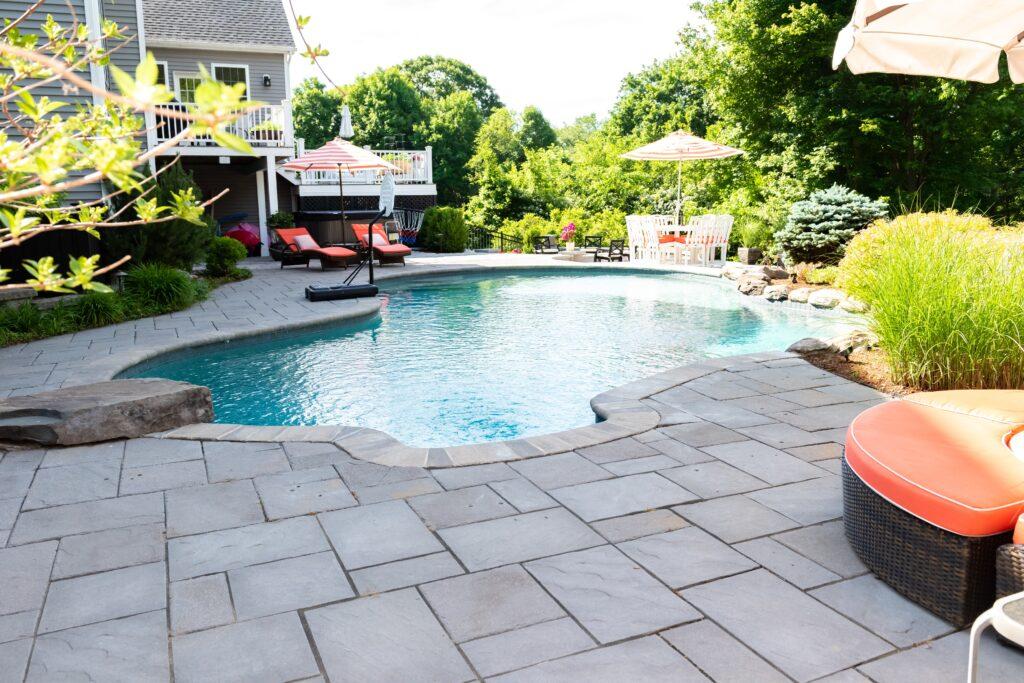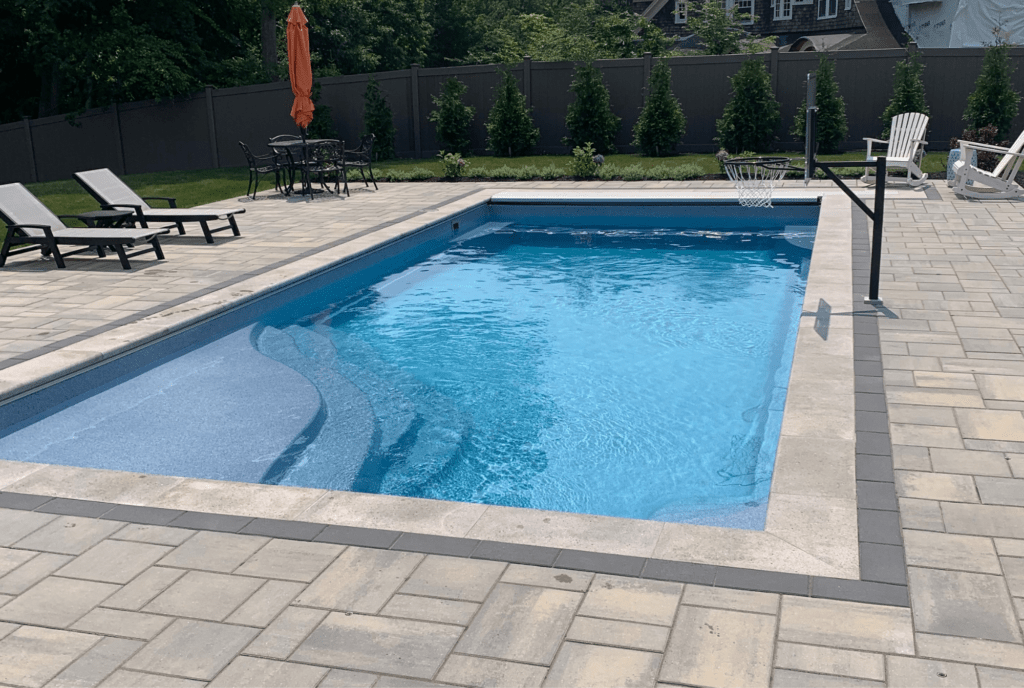Gunite Pools vs Fiberglass Pools
Everything You Need to Know About Fiberglass and Gunite Pools
If you are in the market for a brand-new swimming pool, and are not too familiar with fiberglass and gunite (concrete), it is a good start to know that they are two very different swimming pools. They look different. They feel different and once you have a better understanding of the differences between the two deciding which swimming pool is right for you will become clear.
Let’s explore the main areas that distinguish the difference between both and dive into the pros and cons, the pool installation process, the different shapes and sizes, and most importantly the maintenance after installation.
What is a fiberglass pool?
A fiberglass pool put simply is a manufactured pre-built fiberglass shell that can be installed as an in-ground or above-ground (free standing) pool in your desired location in a matter of days. Fiberglass pools are known for their very smooth finish due to the gel coating applied over the raw fiberglass.
What is a gunite pool?
A gunite pool is a concrete pool made from a blend of sand, cement, and water that is applied through a high-pressure hose, the gunite pool is best known for its dependable structural strength. Gunite pool designs are durable, long-lasting, and are custom-made to fit any shape or size to suit your specific needs and wants with your pool.
Now that you have a better understanding of the fiberglass and gunite pool, let’s take a closer look at the pros and cons of each.

20×40 gunite pool with a large sun shelf
Fiberglass pools pros and cons:
Pros:
- Quick installation – if you are looking for a quick install, fiberglass pools can be up and running in as little as 2-3 days.
- Low maintenance – fiberglass is a smooth, nonporous surface so algae will not stick to the walls. While there will still be algae in fiberglass pool water, it will not be on the walls. This means less time cleaning and less money spent on chemicals.
- Durability – fiberglass pools are resilient to normal wear and tear, as well as elements like sun and harsh weather, meaning they should not need major repairs down the road.
- Range of sizes – fiberglass pool sizes can be built as small as 10×16 – 4ft and as large as 16×40
- Lower cost – depending on your preference for shape and size, fiberglass pools inclusive of equipment can range from $55k-$70k. This is often a lower cost option compared with a custom gunite pool.
Cons:
- Lack of flexibility – fiberglass pools are factory built as a shell and shipped intact to your home, leaving not too much exploration and creativity to the home owner. Essentially, you purchase them “off-the-shelf” in a fixed size and fixed shape.
- Low availability – in some seasons, fiberglass pools can be in high demand, which can cause delays and an increased waiting time for delivery and installation.
- Manufacturing flaws – fiberglass pools, if not manufactured properly, can develop bubbles or crazing. If this happens however, it is relatively easy to buff out flaws. Once done, fiberglass can look as good as new.

Fiberglass pool with surrounding paved patio.
Gunite pool pros and cons:
Pros:
- Flexible design – if you are after a specific shape, an extra-large or extra deep pool, gunite is great for this. Gunite pools are custom-built on-site and can be designed in a way that best fits with your existing landscape design. While the gunite pool building process takes longer than a fiberglass pool installation, this construction process allows for more flexibility in shape, size, and depth.
- Extra features – if you want a lagoon style pool with built-in rock formations, waterfalls or underwater bench seating, gunite goes much further in this direction than fiberglass.
- Customized finishes – gunite plaster is available in a range if colors, or you can even opt for a pebble or tile finish. With plenty of options you will be sure to find a finish that suits your home and landscape design.
Cons:
- Maintenance costs – gunite pools require more maintenance than fiberglass. Every 7-10 years gunite pool resurfacing should take place to keep it in great condition and looking like new.
- Chemical usage – due to the materials used in gunite pools, more chemicals are required to maintain them and to avoid damaging the pool’s surface.
- Longer installation time – gunite pool installation can be a long process as all the work is done on-site. Depending on the complexity of your custom-designed pool the installation from start to finish can take from weeks to months to finalize.

Large lagoon style gunite pool with paved patio
Gunite Pools vs Fiberglass Pools Installation
Here is one huge difference.
The fiberglass pool installation is generally a very quick and easy process. Because the shell comes pre-built from the manufacturer, essentially, the installation process is a matter of simply dropping the shell in the dug-up hole and connecting the plumbing.
The installation and construction of a gunite pool are much more complicated, as all the work is done onsite. A fiberglass pool can be installed in a matter of days, gunite concrete pools typically take weeks, or in some cases, months to design and build.
How long does a gunite pool last compared to a fiberglass pool?
Fiberglass pools can last up to 15-50 years before they require resurfacing. The first signs that fiberglass pool resurfacing is needed are minor cracks and topcoat discoloration which can only be eliminated through resurfacing.
On the other hand, it is good to know how often gunite pools need to be resurfaced. Certainly, they have the edge when it comes to aesthetics, but they do need additional maintenance to keep them in their pristine condition. On average, gunite swimming pools can last 7-10 years before they need to be resurfaced.
What are the different designs, shapes, and sizes of fiberglass and gunite pools?
Fiberglass pools come in an array of ready-built shapes and sizes. Most fiberglass pool shapes fall into one of the below shapes:
- Freeform
- Kidney
- Rectangular
- Roman
Fiberglass pools do vary in sizes:
Smallest sizes:
- 10×16 – 4ft deep rectangle
- 11×22 -5 ft deep freeform
Largest sizes:
- 16×40 – 8 ft rectangle
- 16×40 – 6’6” freeform
As the gunite is a custom-designed and built in-ground pool, the gunite offers unlimited creativity and is a pool that can be designed to the shape and size to fit seamlessly into your landscape.

Large fiberglass pool installation in Wenham.
The verdict:
As you now know, the difference between fiberglass pool vs gunite pool is substantial. Gunite pools are custom made and are fairly popular, but fiberglass pools are quick to install and low maintenance.
The possibilities are endless when it comes to designing a custom gunite pool or fiberglass pool. With over 30 years’ experience building and designing high-end pool projects across Massachusetts, The Patio Company can help you bring your vision to life.
Check out our previous pool building projects or contact us today and tell us about your dream project – we cannot wait to hear your ideas!








Follow Us